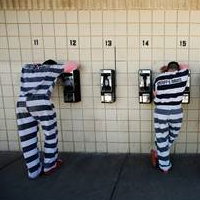FCC Acts on 12-Year-Old Petition, Limits Gouging Inmates for Phone Calls
 (photo: Charlie Riedel, Association Press)
(photo: Charlie Riedel, Association Press)
If you can’t exploit jail and prison inmates, who can you exploit?
That will be the difficult question facing the two companies and local governments that charge prisoners monopolistic prices for telephone calls to the outside now that the Federal Communications Commission (FCC) has ruled the worst of the gouging has to end. The commission capped rates for local and in-state long-distance inmate calling, and cut the FCC’s existing cap on interstate long-distance calls by up to 50%.
That will put a dent in the revenue stream enjoyed by Securus Technologies and Global Tel-Link, which control 80% of the $1.2-billion market between them, unless the courts intervene. It will also present a quandary for local governments that allow the sky-high charges in exchange for a hefty commission.
California began phasing out the commissions for state facilities in 2007 and finished in 2011. But that still left an estimated $50-million in commissions for counties and their jails, which were forced by state law to use the money on inmates. That would be a big chunk of change to lose, and taxpayers may be loath to find another revenue source.
Cory Salzillo, legislative director for the California State Sheriffs’ Association, told KQED the FCC ruling “creates a situation where inmates will be deprived of much needed funding for things like treatment, rehabilitation programs, vocational, educational programs and recreational programs.”
In addition to creating a smaller revenue pie, the FCC discouraged, but did not ban, telecommunications companies from paying commissions out of it to local governments. The commission did, however, encourage the states to take action on the issue. Counties have three months to comply with the federal order.
In making its announcement last week that it was reining in “excessive rates and egregious fees,” the FCC acknowledged that it had been a long time coming. The commission mentioned in passing that it was a petition from Martha Wright, asking for relief from the high costs of talking to her grandson in prison, that spurred them to action.
Wright filed the petition in November 2003, complaining of having to pay $200 a month to the phone company. The retired nurse from Washington, D.C. was still alive when the FCC acted on her petition in 2013 and set an interim cap of 21 cents per minute on interstate debit and prepaid calls. Wright died earlier this year at the age of 87.
The new ruling extends the interstate ruling to intrastate and tightens up the caps. It lowers the cap to 11 cents for all 15-minute local and long distance calls from state and federal prisons, while allowing county jails the flexibility of tiered rates. Some facilities charged $14 a minute. The FCC also capped the plethora of ancillary fees, including third-party financial transaction fees, paper bill fees and fees for automated payment by phone or website.
–Ken Broder
To Learn More:
Feds Make Calling Home More Affordable for Inmates (by Sukey Lewis, KQED)
FCC Votes to Further Cut Cost of Calls for Inmates (by Heather Hollingsworth, Associated Press)
Nationwide PLN Survey Examines Prison Phone Contracts, Kickbacks (by John E. Dannenberg, Prison Legal News)
Prisons Increase Profits by Replacing In-Person Family Visits with Video Screens (by Steve Straehley, AllGov)
FCC Takes Next Big Steps in Reducing Inmate Calling Rates (Federal Communications Commission)
- Top Stories
- Controversies
- Where is the Money Going?
- California and the Nation
- Appointments and Resignations
- Unusual News
- Latest News
- California Forbids U.S. Immigration Agents from Pretending to be Police
- California Lawmakers Urged to Strip “Self-Dealing” Tax Board of Its Duties
- Big Oil’s Grip on California
- Santa Cruz Police See Homeland Security Betrayal in Use of Gang Roundup as Cover for Immigration Raid
- Oil Companies Face Deadline to Stop Polluting California Groundwater





